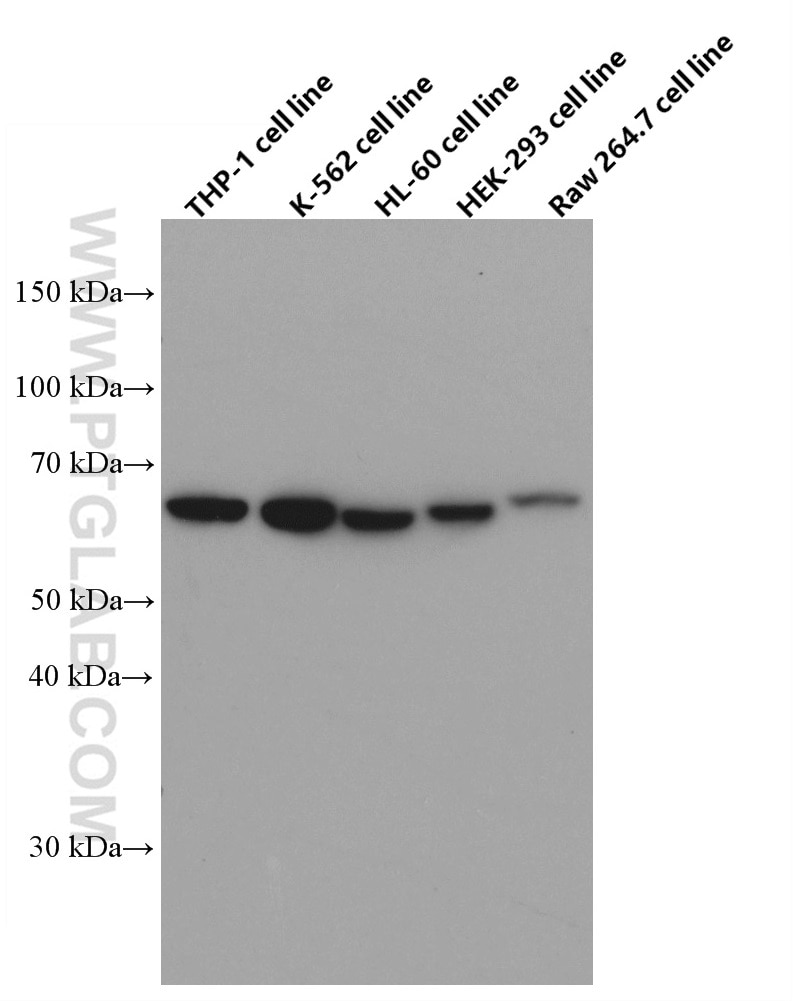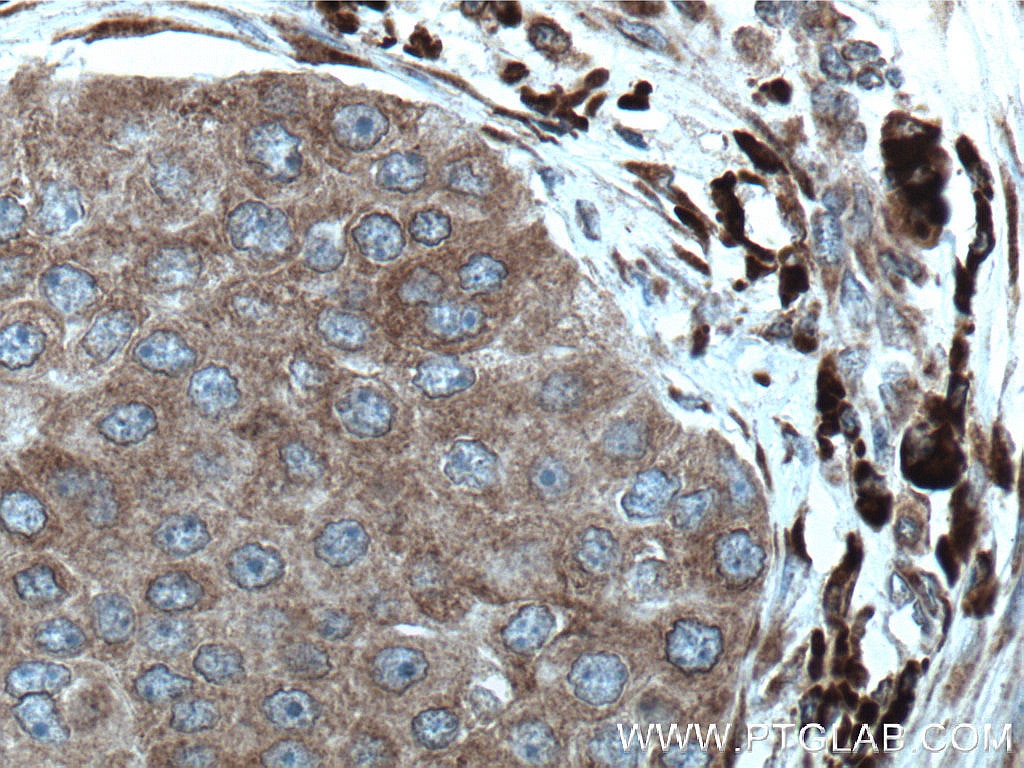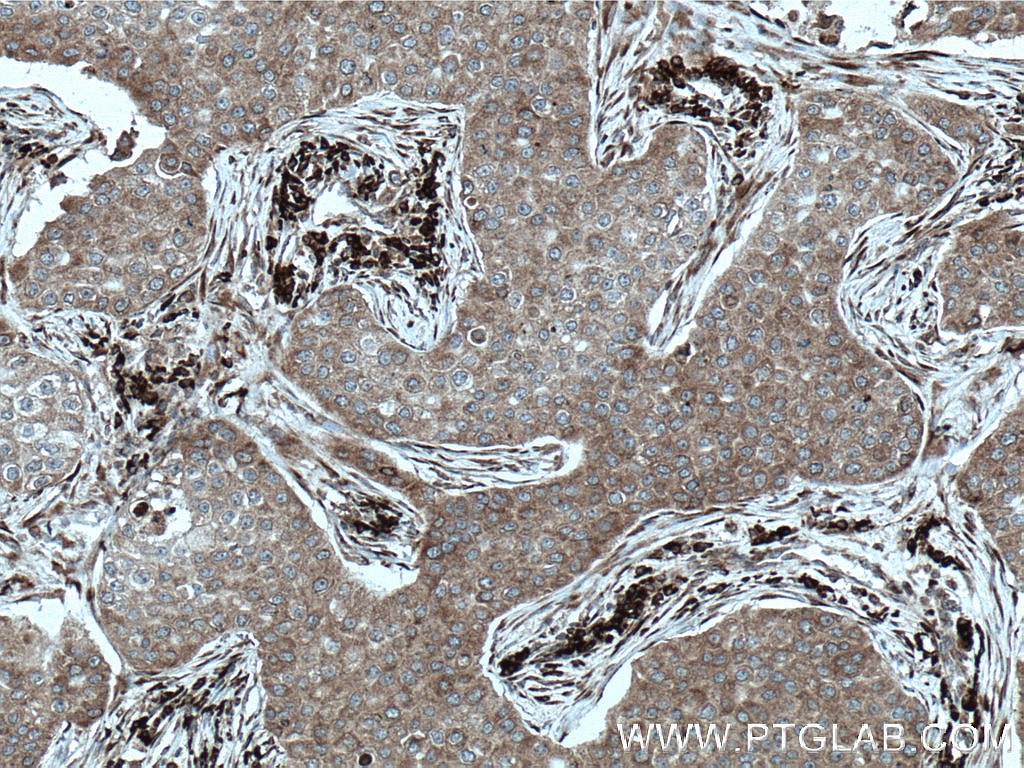Tested Applications
| Positive WB detected in | THP-1 cells, K-562 cells, HL-60 cells, HEK-293 cells, RAW 264.7 cells |
| Positive IHC detected in | human breast cancer tissue Note: suggested antigen retrieval with TE buffer pH 9.0; (*) Alternatively, antigen retrieval may be performed with citrate buffer pH 6.0 |
Recommended dilution
| Application | Dilution |
|---|---|
| Western Blot (WB) | WB : 1:1000-1:6000 |
| Immunohistochemistry (IHC) | IHC : 1:50-1:500 |
| It is recommended that this reagent should be titrated in each testing system to obtain optimal results. | |
| Sample-dependent, Check data in validation data gallery. | |
Published Applications
| KD/KO | See 1 publications below |
| WB | See 2 publications below |
| IHC | See 2 publications below |
| IF | See 2 publications below |
Product Information
66581-1-Ig targets STT3A in WB, IHC, IF, ELISA applications and shows reactivity with human, mouse, rat samples.
| Tested Reactivity | human, mouse, rat |
| Cited Reactivity | human |
| Host / Isotype | Mouse / IgG1 |
| Class | Monoclonal |
| Type | Antibody |
| Immunogen | STT3A fusion protein Ag27072 Predict reactive species |
| Full Name | STT3, subunit of the oligosaccharyltransferase complex, homolog A (S. cerevisiae) |
| Calculated Molecular Weight | 705 aa, 81 kDa |
| Observed Molecular Weight | 65 kDa |
| GenBank Accession Number | BC020965 |
| Gene Symbol | STT3A |
| Gene ID (NCBI) | 3703 |
| RRID | AB_2881941 |
| Conjugate | Unconjugated |
| Form | Liquid |
| Purification Method | Protein G purification |
| UNIPROT ID | P46977 |
| Storage Buffer | PBS with 0.02% sodium azide and 50% glycerol, pH 7.3. |
| Storage Conditions | Store at -20°C. Stable for one year after shipment. Aliquoting is unnecessary for -20oC storage. 20ul sizes contain 0.1% BSA. |
Background Information
STT3A, also named as Integral membrane protein 1, belongs to the STT3 family. STT3A is expressed at high levels in placenta, liver, muscle and pancreas, and at very low levels in brain, lung and kidney. STT3A is a catalytic subunit of the N-oligosaccharyl transferase (OST) complex which catalyzes the transfer of a high mannose oligosaccharide from a lipid-linked oligosaccharide donor to an asparagine residue within an Asn-X-Ser/Thr consensus motif in nascent polypeptide chains. STT3A is present in the majority of OST complexes and mediates cotranslational N-glycosylation of most sites on target proteins, while STT3B-containing complexes are required for efficient post-translational glycosylation and mediate glycosylation of sites that have been skipped by STT3A. There are two isoforms of STT3A with molecular weight of 81 and 70 kDa. 66581-1-Ig antibody detects a protein around 65-70 kDa in SDS-PAGE which is similar to papers published. (PMID: 32005703, 25135935)
Protocols
| Product Specific Protocols | |
|---|---|
| WB protocol for STT3A antibody 66581-1-Ig | Download protocol |
| IHC protocol for STT3A antibody 66581-1-Ig | Download protocol |
| Standard Protocols | |
|---|---|
| Click here to view our Standard Protocols |
Publications
| Species | Application | Title |
|---|---|---|
Transl Lung Cancer Res Targeting STT3A produces an anti-tumor effect in lung adenocarcinoma by blocking the MAPK and PI3K/AKT signaling pathway. | ||
Front Immunol Analysis of Tumor Glycosylation Characteristics and Implications for Immune Checkpoint Inhibitor's Efficacy for Breast Cancer. | ||
Cancer Lett Pharmacological suppression of HHLA2 glycosylation restores anti-tumor immunity in colorectal cancer | ||
Adv Sci (Weinh) N-glycosylation Modification of CTSD Affects Liver Metastases in Colorectal Cancer
|







